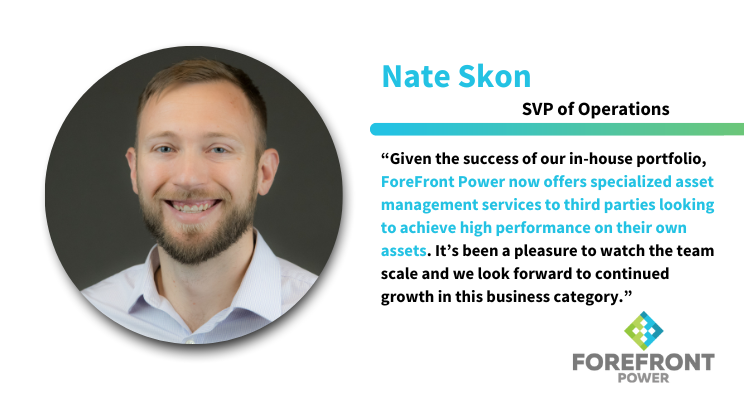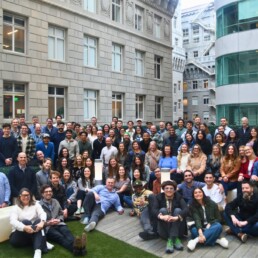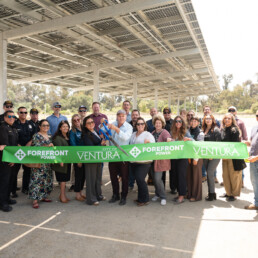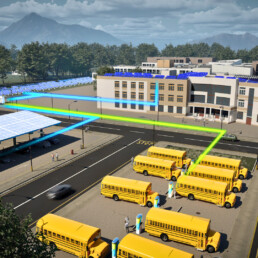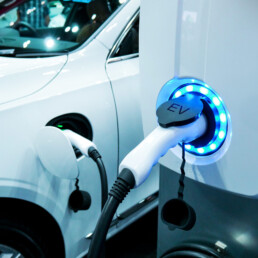We sat down with our SVP of Operations Nate Skon to learn more about how he’s building out ForeFront Power’s asset management business as the portfolio grows in quantity and expands into new markets beyond behind-the-meter solar like electric vehicle infrastructure.
Where are you from originally?
I’m a Canadian-Minnesotan. My mom’s Canadian, my dad is Minnesotan. I was born in Canada but then was mainly brought up in Minnesota. I definitely carry both of those places close in my identity.
What do you like to do in your free time? Do you have any hobbies?
I’m very passionate about getting my own family’s home to net zero, which will take, by my estimate, 4 to 5 years. So far we’ve gotten solar power, a backup battery, geothermal, and we’re slowly electrifying everything in the home.
I’m also a dad to three young kids which is close to a full monopoly on my time. With the free time I do carve out, I love being outside. I play basketball twice a week, live close to a nature preserve that has over 80 miles of trail where I go to run or hike with my family, and enjoy paddling on the Hudson.
What did you want to be when you grew up?
When I was a kid, I lived and breathed baseball. I collected baseball cards obsessively–I definitely wanted to be a baseball player. Once I was starting college and professional sports proved to be out of the picture, I became excited about being an engineer because my grandfather had been an engineer.
How did you end up working in the energy field?
I realized that climate was the existential crisis of our time, so I knew I wanted to be in the renewable energy field. Out of undergrad, I began working in consulting and initially had a hard time transitioning into renewables. I wanted to get that additional credential to help me get my foot in the door–that was part of the reason I got an MBA in international finance. I tailored the degree toward renewable energy, and did a module abroad in Brazil looking at their wind industry. After I finished my MBA, I started in a finance role at SunPower and have been rooted in solar ever since.
How did you find ForeFront Power?
I was on the original team that started ForeFront Power. I was originally in a core finance role undertaking the company’s financial planning and analysis, and really helping ramp up the financial operations from the beginning. Then with Mitsui’s focus on long-term investments in infrastructure, we started structuring financing so that Mitsui was sitting in the long term equity position. Now at ForeFront, we’re building solar projects that have a 30-40 year lifespan with lifetime ownership in mind
Originally, ForeFront Power was thinking asset management would be fully outsourced. Early on, back in 2018, we hired a third party to manage our assets but then quickly recognized there were a lot of shortcomings in the approach. We realized we needed to build an asset management team with the care and expertise we hold in-house, and I had the opportunity to move to the asset management side of the house, to which I felt drawn to because of the good mix of technical and financial.
Our in-house asset management team has improved performance every year and has achieved an incredibly strong 99% of performance estimates on our operating portfolio in 2023. Given that success on our owned portfolio, we decided to offer our specialized services to third parties looking to achieve similar performance on their own assets. It’s really been a pleasure to watch the team scale our efforts in this way, and we look forward to a lot of growth in this business category.
What do you enjoy most about working in asset management for the renewable energy field? What do you find most challenging?
I’m very fortunate to have a really committed, capable, and dedicated asset management team and that makes the role honestly so enjoyable. What’s really cool about ForeFront’s business is that we’re continuously working on an ever growing fleet and once those are built, they come to asset management causing our managed fleet to continually grow year over year and nonlinearly. We’re now to a point where we have over 200 C&I-scale assets operating across15 states, and managing an ever growing fleet of solar and storage assets is a fun challenge for our team.
Again, it’s been exciting to watch our team further optimize the financial savings and technical performance of our solar assets over recent quarters. This is a significant piece of how we’re growing our asset management business. When developers, investors, and even commercial/industrial owner-operators hear that our total portfolio has delivered an industry-leading 99% of estimates – a whole 7% above the industry average that has been steadily falling in recent years – we create quick engagement.
How have you seen the solar energy industry evolve over the years?
I’ve been in solar for 15 years and if I look at the start of my career, solar energy was this tiny little niche energy source. Today it’s the cheapest energy source that the planet’s ever seen and I think that that evolution has happened very fast. The scale of the industry has enabled incredible price decreases and very quickly.
Now we sit at this amazing time for solar because we have the largest and most progressive infrastructure bill we’ve ever seen in the Inflation Reduction Act (IRA). The IRA gives more visibility to executing on renewable opportunities than ever before. We now have a ten-year runway on the core ITC incentive and then you pair that up with the all-in cost of solar dropping every year and it’s competing in unsubsidized markets against any other source of energy and winning. Truly the future for renewables and clean vehicle infrastructure has never been brighter.
What do you envision for the future of the energy industry and what is ForeFront Power’s role in building that future?
There’s so much momentum behind electrifying everything. The amount of incremental grid energy and infrastructure upgrades that we’re going to need to support electrifying vehicles means there is incredible opportunity for distributed energy and EV charging infrastructure. For ForeFront that’s going to mean continuing to innovate beyond solar and storage, and bringing eMobility to our existing and new customer base. I see EV charging infrastructure growing even more quickly as a business product for ForeFront Power in the next 2-3 years.
We’re also driving new innovative offerings by piloting multiple new solutions that have massive potential for ForeFront and the entire industry. When you look at the future of ForeFront, these innovations are going to be a big part of enabling expanded opportunities in new markets.
What are your hopes for the current administration in terms of energy and infrastructure policy?
NS: The Biden administration policy has made incredible achievements just in pushing through the Inflation Reduction Act. Prior to that policy, there were iterations that would have had an even bigger green infrastructure bill, but the one that was passed in the current political environment I think was a massive win. It’s still a significant and meaningful change to our energy infrastructure and it enables the ability to drop US carbon emissions by 40% from the 2005 benchmark.
Historically, energy policy has led to boom-and-bust cycles because incentive structures have had short term periods and then dropped off a predetermined cliff. Because we were still a new industry, getting financing had been very challenging and in this policy framework, even more difficult. The 2022 IRA provides much more certainty for the financing of projects as well as for the development of new renewable energy markets.
What advice would you give to young people pursuing energy careers today?
NS: I would say 100% just go for it. Especially when you’re early on in your career, you have the biggest risk appetite you’ll ever have. Take the most progressive, risky view you can in emerging renewable opportunities. Even if it’s a brand new technology in renewables, that presents an amazing opportunity to learn and grow while you are early in your career.
Interested in learning more?
We would love to discuss how our solutions might be a fit for your organization. Contact one of our solar, storage, or e-mobility experts today:


